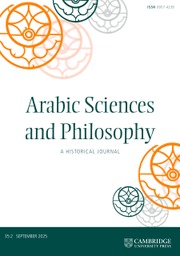Article contents
SPIRITS: THE REACTIVE SUBSTANCES IN JĀBIR'S ALCHEMY
Published online by Cambridge University Press: 15 February 2006
Abstract
The spirits (arwāḥ) found in Arabic alchemical texts, namely zi'baq, kibrīt, nūshādir and zarnīkh are identified with their modern counterparts, which are mercury, sulfur, ammonium chloride (carbonate) and arsenic (arsenous) sulfide, respectively. Jābir's conception of spirits has been shown to be related to his practice. The puzzling experiments of Jābir on ‘mineral and organic’ spirits are compared as far as possible with modern knowledge of chemistry. These comparisons lead to an understanding of Jābir's sequence of manipulations within the logic of his alchemy. In treatment of naturally occuring spirits, Jābir aimed at removing the combustibility of spirits and so improving their effect on fusible bodies. Jābir's notion of transmutation (iqlāb) of fusible bodies is shown to be a flexible term that is equivalent to purification (tanẓīf) or reformation (iṣlāḥ).
- Type
- Research Article
- Information
- Copyright
- 2006 Cambridge University Press
- 2
- Cited by


